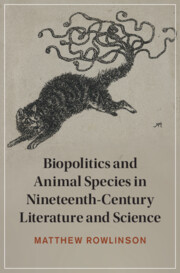Refine search
Actions for selected content:
102 results
The more-than-human biopolitics of swarming – complexity, emergence, and control in military robotics
-
- Journal:
- European Journal of International Security , First View
- Published online by Cambridge University Press:
- 20 October 2025, pp. 1-18
-
- Article
-
- You have access
- Open access
- HTML
- Export citation
Chapter 17 - Imagining and Occupying Wall Street
- from Part II - Histories
-
-
- Book:
- Money and American Literature
- Published online:
- 03 July 2025
- Print publication:
- 17 July 2025, pp 293-310
-
- Chapter
- Export citation
19 - Nazi Biopolitics: Eugenics, Racial Policy, and the Persecution of “Asoziale,” 1933–1939
-
-
- Book:
- The Cambridge History of the Holocaust
- Published online:
- 16 May 2025
- Print publication:
- 12 June 2025, pp 393-419
-
- Chapter
- Export citation
“Coming Out as Female Has Been a Gradual Process”: Combating Trans Necropolitical Governance in Canadian Corrections
-
- Journal:
- Canadian Journal of Law & Society / La Revue Canadienne Droit et Société / Volume 40 / Issue 1 / April 2025
- Published online by Cambridge University Press:
- 21 May 2025, pp. 98-121
-
- Article
-
- You have access
- Open access
- HTML
- Export citation
The Power to Kill Life Itself: Michel Foucault, Biopolitics, and the Political Challenge of Human Extinction
-
- Journal:
- Perspectives on Politics , First View
- Published online by Cambridge University Press:
- 20 March 2025, pp. 1-16
-
- Article
-
- You have access
- Open access
- HTML
- Export citation
German Pharmaceutical Imperialism in Brazil: Cinchona, Biopolitics, and Hybrid Knowledge in the Early 19th Century
-
- Journal:
- Central European History / Volume 58 / Issue 2 / June 2025
- Published online by Cambridge University Press:
- 20 January 2025, pp. 200-224
- Print publication:
- June 2025
-
- Article
-
- You have access
- Open access
- HTML
- Export citation
Chapter 11 - Mere Being
- from Part II - On Literary History
-
- Book:
- The Possibility of Literature
- Published online:
- 10 October 2024
- Print publication:
- 05 September 2024, pp 227-252
-
- Chapter
- Export citation
Chapter 3 - A Leap Out of Our Biology
- from Part I - On Writers
-
- Book:
- The Possibility of Literature
- Published online:
- 10 October 2024
- Print publication:
- 05 September 2024, pp 63-86
-
- Chapter
- Export citation
Chapter 8 - The Anatomy of Realism
- from Part II - On Literary History
-
- Book:
- The Possibility of Literature
- Published online:
- 10 October 2024
- Print publication:
- 05 September 2024, pp 169-186
-
- Chapter
- Export citation
Chapter 5 - The Promise and Treachery of Nutrition in DOHaD
- from Section 2 - The Social Life of DOHaD
-
-
- Book:
- The Handbook of DOHaD and Society
- Published online:
- 20 June 2024
- Print publication:
- 27 June 2024, pp 69-80
-
- Chapter
-
- You have access
- Open access
- HTML
- Export citation
1 - Trans/Atlantic Origin Stories
- from The Sexuality of American History
-
-
- Book:
- The Cambridge History of Queer American Literature
- Published online:
- 17 May 2024
- Print publication:
- 06 June 2024, pp 33-54
-
- Chapter
- Export citation
Introduction
-
- Book:
- Feral Empire
- Published online:
- 30 May 2024
- Print publication:
- 06 June 2024, pp 1-13
-
- Chapter
- Export citation
Chapter 14 - Science in Argentine Literature
- from Part II - Critical Inroads
-
-
- Book:
- A History of Argentine Literature
- Published online:
- 09 May 2024
- Print publication:
- 16 May 2024, pp 216-231
-
- Chapter
- Export citation
Chapter 7 - Latinx Belonging in New World Borders
-
-
- Book:
- The Cambridge Companion to American Utopian Literature and Culture since 1945
- Published online:
- 09 May 2024
- Print publication:
- 16 May 2024, pp 133-151
-
- Chapter
- Export citation
1 - Chornobyl Body Politics
- from Part I - Geographies of Environmental Violence
-
-
- Book:
- Exploring Environmental Violence
- Published online:
- 06 June 2024
- Print publication:
- 09 May 2024, pp 25-49
-
- Chapter
-
- You have access
- Open access
- HTML
- Export citation
Chapter 7 - Eco-consciousness
- from Part II - American Politics, American Wars
-
-
- Book:
- Robert Lowell In Context
- Published online:
- 28 March 2024
- Print publication:
- 04 April 2024, pp 74-84
-
- Chapter
- Export citation
Introduction - Method and Field
-
- Book:
- Biopolitics and Animal Species in Nineteenth-Century Literature and Science
- Published online:
- 11 January 2024
- Print publication:
- 01 February 2024, pp 1-6
-
- Chapter
- Export citation
Chapter 17 - The Human Endeavour
- from Part III - Applications: Politics
-
-
- Book:
- Literature and Medicine
- Published online:
- 17 January 2024
- Print publication:
- 18 January 2024, pp 297-312
-
- Chapter
- Export citation

Biopolitics and Animal Species in Nineteenth-Century Literature and Science
-
- Published online:
- 11 January 2024
- Print publication:
- 01 February 2024
15 - Anthropologies of Reproduction, Abortion, and Biopolitics
- from Part Three - Resistances and Intersections
-
-
- Book:
- The Cambridge Handbook for the Anthropology of Gender and Sexuality
- Published online:
- 29 September 2023
- Print publication:
- 19 October 2023, pp 395-424
-
- Chapter
- Export citation
